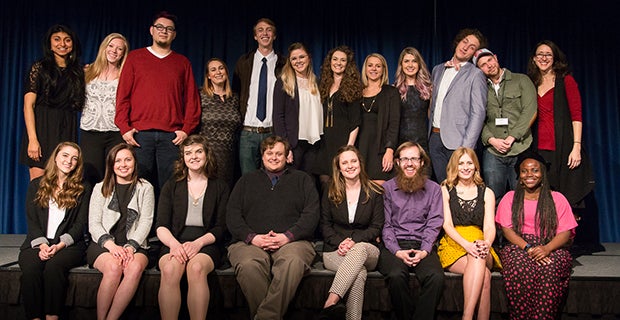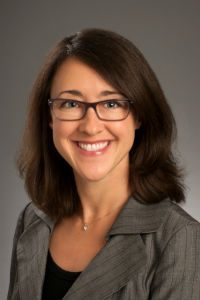
Boise State University President Bob Kustra has appointed Kelly Myers to be the project director for the university’s Beyond the Major initiative.

Myers, an assistant professor in the Department of English who has helped a group of undergraduate students launch and sustain the Ethos Project, has been working with Kustra, Provost Martin Schimpf and others in developing a plan to sustainably build the Beyond the Major concepts into the fabric of the Boise State campus.
This past fall, Kustra challenged faculty and staff to build a student-focused culture that fostered opportunities and experiences beyond each student’s chosen major. He said Boise State must continue to expand hands-on internships and research work, courses and learning pathways aimed at boosting specific skills and competencies, and opportunities to blend and blur disciplines — all of which can help a graduate land a first job and be poised for long-term career success.
“From the start, Kelly has understood how valuable this effort will be to Boise State students and our community — and how quickly we need to build these opportunities into the student experience,” Kustra said. “When people ask me what I hope survives at Boise State long after my tenure as president has ended, the Beyond the Major initiative is at the top of my list. I believe it will continue to distinguish Boise State regionally and nationally, and, more importantly, deliver the higher education our students and region will need to thrive in one of the country’s most vibrant cities and economies.”
The Association of Public and Land-Grant Universities recently released a report called “Ready for Jobs, Careers, and a Lifetime” that discusses the need for these efforts nationally.
Just this week, Gallup and Strada Education Network released a survey of more than 32,500 students from 43 randomly selected four-year institutions, both public and private. As Inside Higher Ed reported: “About 34 percent of those students indicated they were confident that they would graduate with the know-how to succeed in the job market, and 36 percent said they believed they had the skills and knowledge to be successful in their careers. A little more than half of students thought their major could lead to a ‘good job.’”
The Beyond the Major initiative has its roots in courses and certificates aimed at “augmenting” traditional majors, such as the College of Business and Economics’ “Bridge to Career” courses aimed at offering basic business skills to non-business majors, and College of Innovation and Design-launched programs like the leadership certificate run by Heidi Reeder and design ethnography led by Kendall House.
“We have already done so much,” Myers said. “I think we need to start at a place of honoring what we have and making it more visible.”
The ideas behind the initiative have helped drive the launch of the Triple Discipline program in the College of Arts and Sciences, in which students can design their own transdisciplinary degree path by choosing three minors to build a custom major. The concept is informing the expansion of cooperative education through the Work U “internship on steroids” that gives students from liberal arts and other majors hands-on workplace experience with a growing list of local employers, paired with interconnected classroom time to help the students learn and understand the most from their “real world” time. The concepts are integral to the refocused Foundational Studies programs, which are being crafted to help Boise State students determine what they want to become and to both “make a living” and “make a life.”
This kind of intentional student reflection and understanding is critical to the success of Beyond the Major, Myers said. Without that, these efforts could end up “flooding our course catalogues and websites” and add more confusion, more obligations students feel they are failing to meet, and contribute to what Myers calls “the just-tell-me-what-to-do mindset.”
“The value of the college degree used to speak for itself, but now the students have to speak to and provide evidence of the value of their degrees,” she said. “I feel personally responsible to help them do that.”
Schimpf already has asked department chairs and faculty to incorporate the Beyond the Major thinking in both what each discipline has to offer students from elsewhere on campus and how each department can create the opportunity and encouragement for students in their majors to access opportunities to augment their degrees.
The Office of Communications and Marketing has incorporated more direct and understandable language about career pathways and opportunities into tools like Major Finder, which helps prospective students plot out their Boise State experience, and has embedded this concept into the coming web redesign, so departments can highlight potential careers in their disciplines, as well as valuable skills and competencies, to help students better understand how to make the most of their time in college.
Myers plans to embark on a four-step process in taking the next steps:
- Take inventory: See what we do today, because there are related and emerging efforts across campus.
- Connect the dots: Make sure these opportunities and resources are more visible across the campus community.
- Identify opportunities: Encourage collaboration and connections among existing programs.
- Invent: Fill in the gaps, encourage new ideas.
She will report to the provost and work with a steering committee that includes the deans of the colleges of Arts and Sciences and Innovation and Design, the vice provost for undergraduate studies, the vice president for student affairs and enrollment management, associate vice president for communications and marketing and the president’s chief of staff.